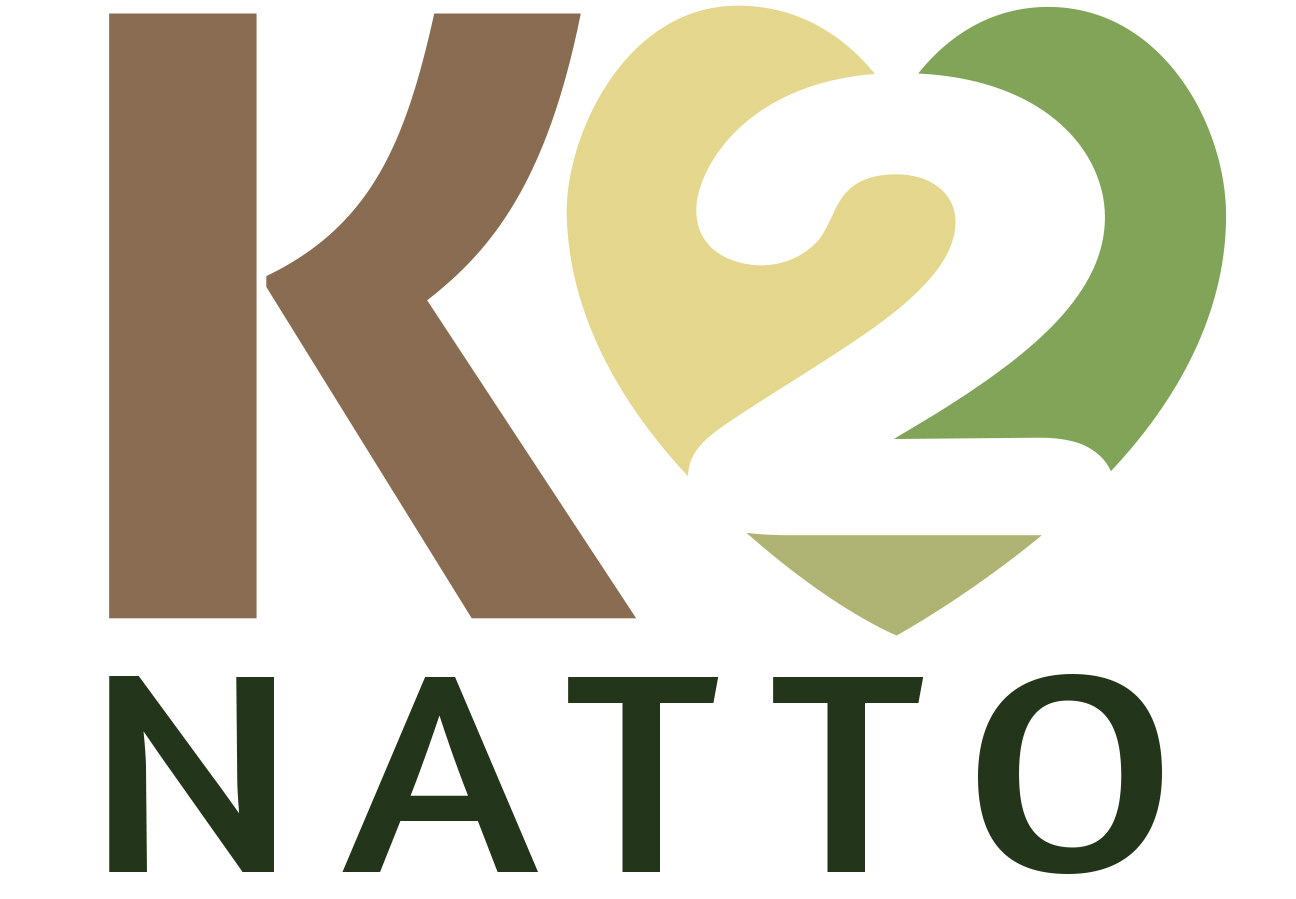
Natto is a traditional Japanese fermented food, created by a bacterial alkaline fermentation.
Even today some natto is made the old-fashion way of fermenting steamed soybeans in rice straw.
The benefits
Prebiotic foods
Natto is made from soybeans and therefore contains a large amount of prebiotic dietary fibre, including inulin. These can support the growth of good microorganisms once they are in our digestive system .
Prebiotic foods are foods that nourish the microbiota. They contain fibre and nutrients, that our internal bacteria and yeast love. By feeding our microbiota, we support its work!
In addition, during fermentation, bacteria produce a substance that covers the soybeans. This substance is also perfect for feeding good bacteria in our digestive system!
Natto contains up to one billion active bacteria per gram These bacteria can survive their journey in our digestive system, allowing them to become part of our microbiota .
The bacteria in natto can then create all sorts of bioactive molecules, which help regulate the body and immune system .
In addition, natto contains many nutrients that can help support the immune system, such as vitamin C, manganese, selenium, zinc, etc.
Natto also contains antibiotic compounds that can eliminate many pathogens, such as H. pylori, S. aureus, and E. coli . Natto has been used for many years to support the immune system of breeding calves and to protect them from infection.
For every 10mcg eaten of vitamin K2 there is a 9% reduction in Cardiovascular disease
“There has been so much research conducted on the health benefits of Natto, for evidence and further reading…”
(https://revolutionfermentation.com/en/blogs/tempeh-soy-grains/health-benefits-natto/#heart
Osteoporosis

Vitamin K2
Natto also contains large amounts of Vitamin K2 a heart health Vitamin
Vitamin K2 (MK-7, is a member of the fat-soluble vitamin K family. ) It is necessary for proper bone development and maintaining a healthy bone mineral density. It assists in calcium absorption to aid in creating and maintaining healthy bones, protecting against osteoporosis. While assisting the absorption of calcium for the bones, it also helps keep the vascular system clear of calcification. This argument was made stronger when research showed that Japanese who eat natto on a daily basis are at much lower risk for bone fractures than Western countries where vitamin K2 deficiency is more common.
Vitamin K2 is important for the maintenance of healthy teeth, and for every 10mcg eaten of vitamin K2 there is a 9% reduction in Cardiovascular disease. If consumed regularly, natto may help reduce heart problems and even help dissolve blood clots! New research is also showing that VitaminK2 could help with stroke reductions due to the activity of the Nattokinaise alongside evidence to show it can help with other diseases including Osteoporosis, and new research with possible links to Alzheimer’s disease.
Vitamin K2 helps to maintain the elasticity of the blood vessels, which reported to be beneficial in postmenopausal women in some clinical trials Vitamin K2 has been shown to have some cancer fighting properties with certain cancers, and some trials have concluded that Vitamin K2 inhibits bone loss even in bone related diseases and may help reduce the amount of fractures in older people who have falls. There is evidence to show it can help with other diseases including osteoporosis, and as some research suggests Alzheimer’s disease. there has also been some research around the benefits of Vitamin K2 and prostrate cancer.
The American Journal of Clinical Nutrition
Dietary intake of vitamin K and risk of prostate cancer in the Heidelberg cohort of the European Prospective Investigation into Cancer and Nutrition (EPIC-Heidelberg)1
To the best of our knowledge, this report provides the first analysis of observational data on the association between dietary intake of vitamin K and the risk of prostate cancer. With higher intakes of menaquinones, prostate cancer risk decreased; this association was significant for advanced prostate cancer, especially with MK-5–9.
Vitamin K2 Reduces Prostate Cancer Risk
Doctors in Germany conducted a study examining the relationships between dietary intake of vitamin K1 and K2 on the development of prostate cancer in 11,319 men over an 8.6-year follow-up.4
Compared with the lowest intake of vitamin K2, men with the highest vitamin K2 dietary consumption showed a 63% reduced incidence of advanced prostate cancer. Intake of vitamin K1 was not related to prostate cancer incidence in this 2008 study.4
Volume 87, Issue 4, April 2008, Pages 985-992
In one study, Nattokinase was shown to effectively and safely maintain healthy blood flow. Nattokinase not only helps maintain healthy blood coagulation, it also supports a healthy inflammatory response and protects against oxidative stress.
Where do you get Vitamin K2?
Primarily from fermented foods and products from grass fed animals and each product will have a specific amount of Vitamin K2 or Meniquinone 7 (MK7) Fermented cheeses such as brie and camembert must be made from milk from grass fed animals to gain the benefit. Another rich food source is Natto which has the highest amount of MK7 almost 1,000mcg per 100g (Source FDA) the enzyme in the Natto is called Nattokinaise and its this which helps to de-calcify the heart and restore better bone health especially as you get older. New research is also showing that VitaminK2 could help with stroke reductions due to the activity of the Natto Kinaise thinning the blood.
We make our own Natto using organic beans from our production kitchen in Northamptonshire and it comes in readily available 100g pots using organic beans and bacillus Subtilis. The recommended intake is varied with some saying 10-35mcg to others around 25-55 mcg a day which is around a teaspoon. I eat it straight from the pot, but it is good with mustard and soy sauce.
The National Academies of Sciences Food and Nutrition Board has not established an upper limit for vitamin K2 since it has a minimal potential for toxicity, and has stated that: “No adverse effects associated with vitamin K2 consumption from food or supplements have been reported in humans or animals.”
Why should you eat it ?
- For every 10mcg eaten of vitamin K2 there is a 9% reduction in Cardiovascular disease
- Natto is a probiotic so good for gut health.
- Natto is made from soybeans and therefore contains a large amount of prebiotic dietary fibre, including inulin. These can support the growth of good microorganisms once they are in our digestive system .
- Natto is rich in protein, minerals and vitamins;
- Natto as a food contains the highest amount of Vitamin K2 1,000mcg per 100g pot
- Natto can bring improvements in Bone health, alongside aid digestion and heart health.
- Natto can benefit sports personnel and body builders being high in Protein without the worry of high fat or sugar its low in salt It is also high in fibre, magnesium copper and Vitamin K2
- Eating Natto can contribute to better skin health and bone metabolism, and through its Vitamin K2 it promotes proper brain function and prevents heart-related diseases.
- In addition, natto contains many nutrients that can help support the immune system, such as Vitamin C, Selenium, Zinc, Sodium, Potassium, Calcium, Iron, Vitamin B6,
- For people with high blood pressure, its decalcification process helps to maintain the elasticity of the blood vessels, so that blood flows better.
- Natto could be beneficial for postmenopausal women.
- Trials have demonstrated that vitamin K2 inhibits bone loss even in bone-related disease.
- New research links vitamin K2 in Natto to longer life expectancy.
- Research suggest it could help in the fight against Alzheimer’s disease.
Natto awaiting labeling

Label on ready to ‘Eat’


